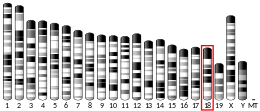GJD4
Appearance
| GJD4 | |||||||||||||||||||||||||||||||||||||||||||||||||||
|---|---|---|---|---|---|---|---|---|---|---|---|---|---|---|---|---|---|---|---|---|---|---|---|---|---|---|---|---|---|---|---|---|---|---|---|---|---|---|---|---|---|---|---|---|---|---|---|---|---|---|---|
| Identifiers | |||||||||||||||||||||||||||||||||||||||||||||||||||
| Aliases | GJD4, CX40.1, gap junction protein delta 4 | ||||||||||||||||||||||||||||||||||||||||||||||||||
| External IDs | OMIM: 611922; MGI: 2444990; HomoloGene: 17692; GeneCards: GJD4; OMA:GJD4 - orthologs | ||||||||||||||||||||||||||||||||||||||||||||||||||
| |||||||||||||||||||||||||||||||||||||||||||||||||||
| |||||||||||||||||||||||||||||||||||||||||||||||||||
| |||||||||||||||||||||||||||||||||||||||||||||||||||
| |||||||||||||||||||||||||||||||||||||||||||||||||||
| Wikidata | |||||||||||||||||||||||||||||||||||||||||||||||||||
| |||||||||||||||||||||||||||||||||||||||||||||||||||
Gap junction delta-4 protein (GJD4), also known as connexin-40.1 (Cx40.1), is a protein that in humans is encoded by the GJD4 gene.[5]
Function
[edit]Connexins, such as GJD4, are involved in the formation of gap junctions, intercellular conduits that directly connect the cytoplasms of contacting cells. Each gap junction channel is formed by docking of 2 hemichannels, each of which contains 6 connexin subunits.[5][6]
References
[edit]- ^ a b c GRCh38: Ensembl release 89: ENSG00000177291 – Ensembl, May 2017
- ^ a b c GRCm38: Ensembl release 89: ENSMUSG00000036855 – Ensembl, May 2017
- ^ "Human PubMed Reference:". National Center for Biotechnology Information, U.S. National Library of Medicine.
- ^ "Mouse PubMed Reference:". National Center for Biotechnology Information, U.S. National Library of Medicine.
- ^ a b "Entrez Gene: gap junction protein".
- ^ Söhl G, Nielsen PA, Eiberger J, Willecke K (2003). "Expression profiles of the novel human connexin genes hCx30.2, hCx40.1, and hCx62 differ from their putative mouse orthologues". Cell Commun. Adhes. 10 (1): 27–36. doi:10.1080/15419060302063. PMID 12881038. S2CID 225894.
This article incorporates text from the United States National Library of Medicine, which is in the public domain.




